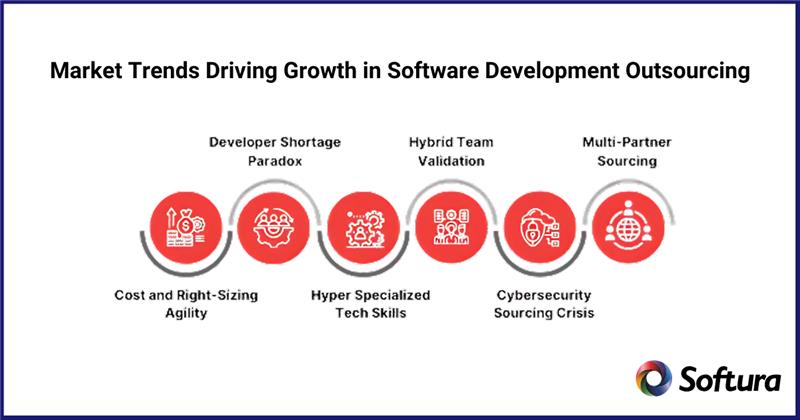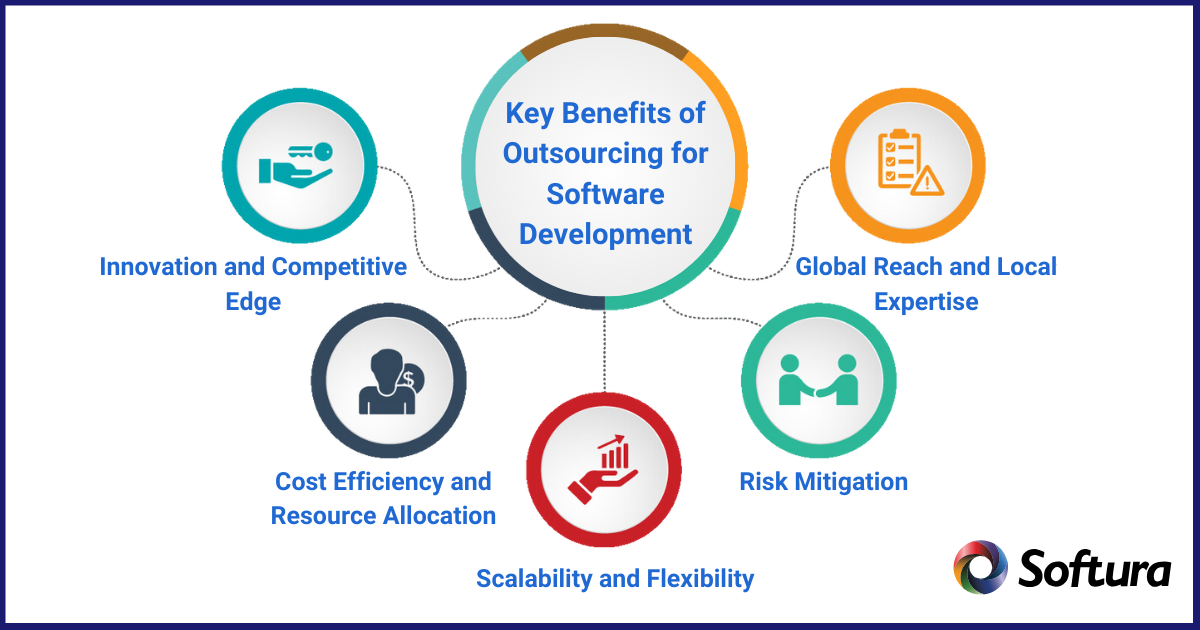"Our integration with the Google Nest smart thermostats through Aidoo Pro represents an unprecedented leap forward for our industry."
- Antonio Mediato, founder and CEO of Airzone.
Software development outsourcing isn’t just a business strategy; it’s a modern solution to a question every organization faces: How do we achieve more, faster, and smarter, without overextending our resources?
In a world where technology shapes success stories, software development outsourcing has emerged as a lifeline for companies looking to scale, innovate, and stay relevant. But what’s fueling this unstoppable growth, and how can your business be part of this transformative trend?
Businesses of all sizes—from startups to global enterprises—are adopting outsourcing strategies. Here’s why:
Outsourcing helps companies save significantly by reducing overhead costs. Instead of hiring full-time in-house teams, businesses can engage experienced developers from regions with lower labor costs, such as Eastern Europe, South Asia, and Latin America.
Example: A U.S.-based company might spend $150/hour for local developers but can outsource the same work for $30/hour without compromising quality.
Beyond direct savings, outsourcing reduces expenses related to office space, equipment, and employee benefits. These cumulative savings allow businesses to allocate resources more effectively toward innovation and growth.
Accessing the global IT talent pool allows businesses to leverage expertise that may be scarce or unavailable locally.
Whether it’s cutting-edge blockchain technology or AI development, outsourcing opens doors to highly specialized professionals.
By partnering with experts from diverse backgrounds, companies gain fresh perspectives and innovative approaches to problem-solving.
Outsourcing teams work around the clock, leveraging different time zones to ensure quicker project completion. This agility allows businesses to launch products faster and stay competitive.
Speed to market is crucial in today’s dynamic environment, where delays can mean losing market share to competitors.
By outsourcing software development, organizations can redirect their focus to core business operations, such as strategy, marketing, and customer engagement.
This enables internal teams to concentrate on building a competitive edge while leaving technical tasks to specialized experts.

"Our integration with the Google Nest smart thermostats through Aidoo Pro represents an unprecedented leap forward for our industry."
- Antonio Mediato, founder and CEO of Airzone.
Several factors underline the rising trajectory of outsourcing:
The global shift toward remote work, accelerated by the pandemic, has elevated outsourcing from a strategic option to an indispensable necessity.
Companies have become more comfortable collaborating with distributed teams.
This shift has dismantled traditional barriers, making outsourcing a natural extension of the remote work culture.
Businesses require expertise in areas like AI, IoT, blockchain, and cybersecurity. Software development Outsourcing services providers often specialize in these domains, enabling companies to stay ahead in innovation.
Investing in such expertise in-house is expensive and time-consuming, making software development outsourcing a strategic shortcut.
Global IT spending is projected to grow by over 8% annually, with a significant portion allocated to software development outsourcing services.
Enterprises recognize the long-term ROI of leveraging external expertise. This trend is particularly evident in industries such as healthcare, fintech, and e-commerce, where technology adoption is critical.
From dedicated development teams to project-based engagements, software development outsourcing providers offer flexible solutions tailored to client needs.
This flexibility is especially valuable for startups and SMEs navigating volatile markets.
"By analyzing the data from our connected lights, devices and systems, our goal is to create additional value for our customers through data-enabled services that unlock new capabilities and experiences."
- Harsh Chitale, leader of Philips Lighting’s Professional Business.
Software development outsourcing provides scalability without the complexities of hiring and onboarding. Organizations can scale their teams up or down depending on the specific requirements of each project.
For example, during peak development phases, businesses can quickly expand their team and scale down once the project is complete.
Software development outsourcing partners share the risks associated with custom software application development, including technological challenges and project delays.
Reputable vendors employ risk management strategies, ensuring projects remain on track even in the face of unforeseen obstacles.
Reputable software development outsourcing firms adhere to high-quality standards, ensuring robust code, comprehensive testing, and timely delivery.
Their dedicated QA teams often outperform in-house teams by bringing extensive experience and best practices to the table.
Post-launch support and maintenance are critical. Many outsourcing vendors offer long-term support contracts to ensure seamless operations.
This ongoing partnership helps businesses address bugs, implement updates, and adapt to changing user needs.

"By analyzing the data from our connected lights, devices and systems, our goal is to create additional value for our customers through data-enabled services that unlock new capabilities and experiences."
- Harsh Chitale, leader of Philips Lighting’s Professional Business.
Choosing the right partner is key to fully unlocking the potential benefits of outsourcing. Consider these steps:
Clearly outline project requirements, timelines, and budgets before engaging an outsourcing firm. Defining specific milestones and deliverables ensures alignment between both parties.
Look for vendors with proven expertise, industry-specific experience, and positive client testimonials.
Platforms like Clutch and LinkedIn can provide insights into a vendor’s reputation and capabilities.
Effective communication is vital. Ensure your partner’s team is fluent in your preferred language and uses modern collaboration tools.
Tools like Slack, Trello, and Jira facilitate transparency and real-time updates.
Ask for case studies and conduct technical assessments to gauge their capabilities. A technical interview or code review can provide deeper insights into the vendor’s skill set.
Begin with a pilot project to test the waters before committing to larger engagements. This approach minimizes risks and builds confidence in the partnership.
"By analyzing the data from our connected lights, devices and systems, our goal is to create additional value for our customers through data-enabled services that unlock new capabilities and experiences."
- Harsh Chitale, leader of Philips Lighting’s Professional Business.
While the benefits of outsourcing are compelling, challenges like data security, cultural differences, and time zone management require proactive solutions:
Work with vendors that comply with global security standards such as ISO 27001 and GDPR.
Additionally, implementing secure coding practices and non-disclosure agreements (NDAs) can safeguard intellectual property.
Invest time in understanding cultural nuances and fostering mutual respect within teams.
Team-building activities and cultural awareness training can bridge gaps and enhance collaboration.
Utilize overlapping hours for meetings and rely on asynchronous communication for seamless collaboration.
Scheduling tools and shared project dashboards further enhance productivity.
While the benefits of outsourcing are compelling, challenges like data security, cultural differences, and time zone management require proactive solutions:
Work with vendors that comply with global security standards such as ISO 27001 and GDPR.
Additionally, implementing secure coding practices and non-disclosure agreements (NDAs) can safeguard intellectual property.
Invest time in understanding cultural nuances and fostering mutual respect within teams.
Team-building activities and cultural awareness training can bridge gaps and enhance collaboration.
Utilize overlapping hours for meetings and rely on asynchronous communication for seamless collaboration.
Scheduling tools and shared project dashboards further enhance productivity.
As a leader in the tech industry, I’ve seen firsthand how software development outsourcing transforms businesses.
It’s not just about cost savings; it’s about creating value by tapping into innovation hubs worldwide. For example, one of our projects involved integrating a distributed team from three continents, and the synergy resulted in faster delivery and higher-quality outcomes.
To succeed, treat your software development outsourcing services providers as an extension of your team. Align goals, maintain open communication, and foster a culture of trust.
This collaborative approach turns software development outsourcing into a partnership rather than a transaction.
The growth trajectory of software development outsourcing is undeniable. Here are some predictions:
Looking for Offshore Dedicated Developers?
Our skilled experts are ready to help. Let's discuss your automation needs.
Software development outsourcing is no longer just an option; it’s a strategic imperative for businesses aiming to thrive in the digital age.
By understanding its benefits, navigating its challenges, and selecting the right partners, your company can harness its full potential.
Ready to explore the endless possibilities of outsourcing? At Softura, we bring expertise, innovation, and trust to every project. Let’s build something exceptional together.
Are you ready for your next project?
Unlock your company's full potential with our comprehensive Offshore development services. Contact our experts today to discuss how we can drive your success together.